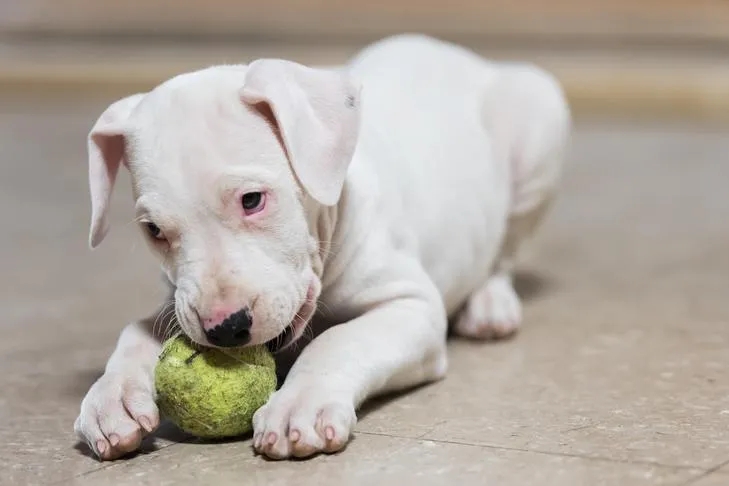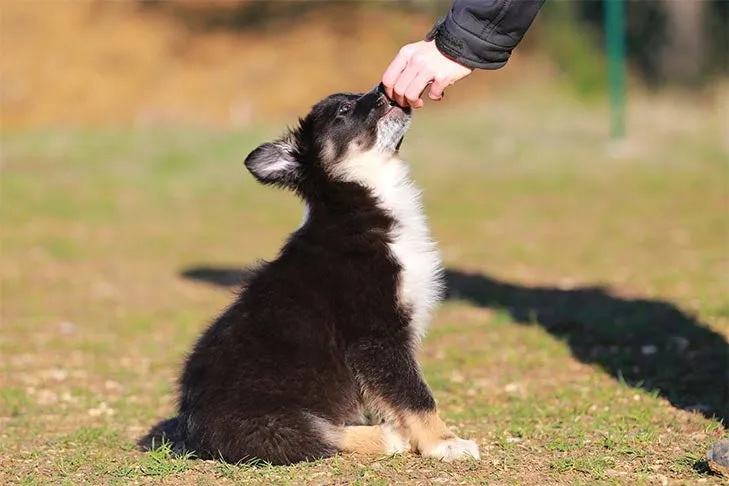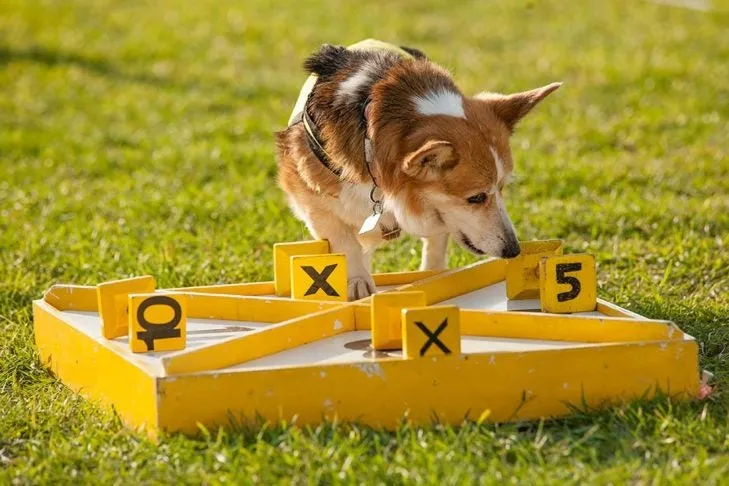Welcoming a new puppy into your home is an exciting time, filled with joy and adorable moments. However, it also comes with the responsibility of teaching them appropriate behaviors, especially when it comes to chewing. Chewing is a completely natural and necessary instinct for puppies. They explore their new world with their mouths, and this activity is crucial for relieving the discomfort of teething as their adult teeth emerge. But as a responsible owner, you want to protect your home from destruction and, more importantly, ensure your puppy’s safety by directing them toward What Is Good For Puppies To Chew. Understanding the right options and strategies will help you guide your furry friend through this developmental stage, fostering positive habits and a harmonious household.
Offer a Variety of Safe and Appropriate Chew Toys
Puppies have an innate drive to chew, making it paramount to provide them with abundant, appropriate outlets. If you don’t offer suitable options, your puppy will undoubtedly create their own from furniture, shoes, or anything else they can get their paws on. Focus on toys specifically designed for puppies, considering their size, age, and chewing strength.
Look for a variety of textures and materials. Soft rubber toys, plush toys without small detachable parts, and durable plastic or nylon chew bones are often excellent choices. For instance, a power chewer might quickly destroy a softer toy, posing a choking hazard, whereas a gentle puppy might prefer something squishier. It’s important to match the chew toy to your dog’s personality and chewing intensity to ensure both enjoyment and safety. When considering options, remember to think about the best snacks for dogs which can sometimes double as safe chew treats under supervision. Always monitor new toys to ensure they hold up to your puppy’s chewing style and don’t break into small, ingestible pieces.
 Dogo Argentino puppy chewing a bright yellow tennis ball, a great example of a safe puppy chew toy.
Dogo Argentino puppy chewing a bright yellow tennis ball, a great example of a safe puppy chew toy.
Utilize Frozen Options for Teething Relief
Just like human babies, puppies experience discomfort when teething. Before they reach six months of age, puppies lose all their deciduous (baby) teeth as their permanent adult teeth erupt. This process can be quite painful and irritating for their tender gums.
Providing cold or frozen chews can offer significant relief from teething pain. Simple and cost-effective options include ice cubes (in moderation) or wet washcloths that have been twisted and frozen. Many companies also produce chew toys specifically designed to be frozen, offering a lasting cool sensation. Another excellent idea is to fill a food-stuffable puppy toy with a mixture of mushy kibble, puppy-safe peanut butter (xylitol-free), or bone broth, then freeze it. This creates a soothing, long-lasting treat that keeps your puppy occupied while alleviating their gum pain. These frozen delights are not only practical for teething but also serve as a great source of mental stimulation.
Consult Your Veterinarian on Safe Chew Choices
Your puppy’s first few vet visits are vital for their overall health, and discussing appropriate chewing options should be a key topic. Your veterinarian can provide tailored advice based on your puppy’s breed, size, and anticipated chewing strength. Different breeds have different jaw strengths and chewing habits, so what might be safe for a small, gentle chewer could be hazardous for a larger, more aggressive one.
Vets can also offer guidance on the suitability of edible chews. While some edible chews like bully sticks are popular, they might be too hard or challenging for a young puppy without all their adult teeth. For these puppies, softer, digestible dental chews or specific puppy-formulated treats might be more appropriate. Always ensure any edible chew is veterinarian-approved and suitable for your puppy’s age and chewing style. Discussing specific dietary concerns and choices, like if is a specific puppy food good for my puppy, can also ensure a holistic approach to your puppy’s health.
Puppy-Proof Your Home to Remove Temptations and Dangers
It’s unrealistic to expect your puppy to differentiate between an expensive chew toy and your favorite pair of sneakers. If an item is within reach and fits in their mouth, a puppy will consider it fair game. In fact, items that smell like you, such as shoes or clothing, can be even more enticing.
Before your puppy arrives, or as soon as possible, thoroughly puppy-proof your home and yard. Store all valuables and dangerous items out of reach. This includes electrical cords, household chemicals, small objects that could be swallowed, and toxic plants. Creating a safe environment means less stress for you and fewer hazards for your curious pup. Regularly check your home for new potential chew targets as your puppy grows and becomes more adventurous.
Active Supervision is Key During Waking Hours
Even with a thoroughly puppy-proofed home, constant supervision is irreplaceable, especially during your puppy’s waking hours. There are countless temptations – a chair leg, the corner of a rug, a dangling curtain pull, or even a loose thread on the couch. Without your watchful eye, any of these could quickly become your dog’s next inappropriate chew toy.
Being present allows you to intervene immediately when your puppy attempts to chew something they shouldn’t. Catching them in the act enables you to firmly but gently interrupt the behavior and immediately redirect them to an appropriate chew toy. This consistent redirection is crucial for teaching them what is good for puppies to chew and reinforces the idea that certain items are theirs to gnaw on, while others are off-limits.
 A Border Collie puppy receiving a training treat, demonstrating positive reinforcement for good behavior.
A Border Collie puppy receiving a training treat, demonstrating positive reinforcement for good behavior.
Crate Training and Safe Isolation for Unsupervised Times
While active supervision is critical, it’s impossible to watch your puppy every single second of the day. For those brief periods when you can’t be directly supervising, ensuring your puppy is in a safe and secure area is paramount. This is where crate training or designating a puppy-proofed room comes into play.
A properly introduced crate can become a comfortable den for your puppy, preventing them from accessing anything destructive or dangerous. Within this safe space, always provide several appropriate chew toys. Consider using food-stuffed chew toys (such as Kongs filled with treats or kibble paste) as these can keep your puppy happily occupied and reinforce the positive association with their crate and appropriate chewing. This strategy effectively gets your puppy “hooked” on chewing acceptable items, even when you’re not directly present.
Teach “Leave It” and “Drop It” Commands
Effective verbal cues are powerful tools for managing your puppy’s chewing habits and ensuring their safety. The “leave it” command tells your puppy not to touch or pick up an item, acting as a crucial preventative measure. This can prevent them from snatching your slipper or, more importantly, from investigating or even eating something potentially hazardous, like dropped medication or toxic foods.
The “drop it” or “out” command is equally vital. It instructs your puppy to release an item they already have in their mouth. Teach this by trading the unwanted object for something better, like a high-value treat or a favorite toy. This positive reinforcement makes them eager to comply. Unless it’s an immediate safety issue, avoid chasing your puppy to retrieve an object, as this can inadvertently turn into a fun “keep-away” game for them, reinforcing the undesired behavior. These commands are fundamental for both discipline and general puppy safety, much like knowing home remedies for upset stomach in dogs is crucial for their well-being.
Ensure Ample Physical and Mental Stimulation
A common culprit behind destructive chewing is boredom. A puppy who isn’t receiving enough physical exercise or mental stimulation will often invent their own entertainment, which frequently involves chewing things they shouldn’t. Just like children, puppies need outlets for their energy and intelligence.
Providing appropriate levels of physical exercise, such as short, frequent walks and interactive playtime, can significantly reduce unwanted chewing. Equally important is mental stimulation through training sessions, puzzle toys, and new experiences. Engaging their minds with activities like teaching new tricks, playing scent games, or using interactive feeders can tire them out just as effectively as physical exertion. A physically and mentally tired puppy is a content puppy, much less likely to seek out inappropriate items to chew. This is especially true before leaving them in their crate or safe area; an active puppy will settle down faster and more easily.
 A Corgi puppy engaging with a puzzle toy, promoting mental stimulation and preventing destructive chewing.
A Corgi puppy engaging with a puzzle toy, promoting mental stimulation and preventing destructive chewing.
Avoid Post-Fact Punishment
One of the most common mistakes new puppy owners make is punishing their dog after the fact. Dogs live in the present moment. If you scold your puppy for chewing a shoe even a minute after the act, they will not connect your anger to the damaged item. Instead, they will only learn to be fearful of you or associate your presence with unpredictable negativity.
Dogs do not understand human language in the way we might try to explain their “wrongdoing.” Showing them the damaged item and scolding them is pointless and counterproductive. If you punish your puppy after the fact, they will learn nothing except that you are scary and unpredictable, which can damage your bond and lead to behavioral issues. Instead, focus on proactive prevention and immediate redirection. If you catch your puppy in the act of chewing something inappropriate, calmly interrupt them, say “no,” and immediately redirect them to an approved chew toy, offering praise when they engage with it. Consistency in this approach, along with providing suitable options and managing their environment, is far more effective than any form of delayed punishment. Just as you’d focus on specific care for conditions like food for dogs with pancreatitis, understanding canine learning is crucial for effective training. Moreover, ensuring your puppy is healthy in general, without underlying issues like healing dry skin in dogs that might cause discomfort, is part of comprehensive care.
Conclusion
Teaching your puppy appropriate chewing habits is a fundamental aspect of responsible pet ownership. By understanding what is good for puppies to chew and implementing the strategies outlined above – providing safe toys, offering teething relief, consulting your vet, puppy-proofing your home, supervising diligently, utilizing crate training, teaching essential commands, and ensuring ample stimulation – you are setting your puppy up for success. Patience, consistency, and positive reinforcement are your greatest allies in this journey. With a thoughtful approach, you can guide your puppy to chew safely and appropriately, leading to a well-behaved companion and a happy, undamaged home environment. Always remember that a puppy’s chewing phase is temporary, and with the right guidance, it can be a manageable and even enjoyable part of their development.
